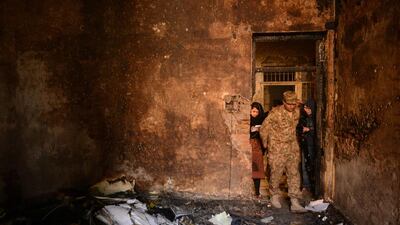ISLAMABAD // In the most horrific way imaginable, Tuesday's murderous assault on an army-run school in Peshawar was a clear admission by Pakistani Taliban insurgents that they are close to defeat.
For almost six years, the Tehrik-i-Taliban Pakistan has been on the receiving end of a campaign of military counteroffensives, involving as many as 150,000 troops, that have succeeded in securing the seven tribal areas bordering Afghanistan that the insurgents once called their emirate.
No longer able to hold territory, the leadership cadre of the TTP and allied militant factions is on the run from an intelligence-led manhunt that, since late November, has been conducted jointly by the Pakistani security services and their American counterparts across the border in Afghanistan.
In seeking to paint the mass murder of schoolchildren as a vendetta, the TTP has acknowledged it can no longer conduct a territory-based war, and is now focused on the launch of hit-and-run terrorist attacks, some against soft targets like the school, but mostly against military personnel and important installations.
That is a far cry from the peak of the TTP insurgency, launched in 2007 after Pakistani special forces assaulted an Islamabad seminary housing hundreds of armed militants. By the spring of 2009, the TTP-held territory that spanned the seven tribal areas bordering Afghanistan and had expanded into the adjoining settled district of Swat, the picturesque home of Nobel peace laureate Malala Yousafzai.
Under the guise of a peace agreement with the government, the militants advanced further eastward and, at one point, were just 60km away from the capital, Islamabad, raising international fears that the TTP would overthrow the government and seize the country's arsenal of nuclear warheads.
Events have since proven that political will was the key to defeating the militants' ambition of establishing a state within Pakistan. The military's tactics have been unforgiving: air power has been used to reduce towns and settlements held by the TTP to rubble, while its leaders have been eliminated, one by one, by CIA drones in coordinated covert operations.
However undesirable those tactics may be, they have worked. By the summer of 2015, the Pakistani military expects to take the last terrorist strongholds, in inaccessible parts of North Waziristan and Khyber tribal areas.
On current form, it is as likely that the TTP chief, Mullah Fazlullah, and several leaders of other militant factions, such as key Haqqani Network ally, Hafiz Gul Bahadur, would have been killed in airstrikes, conducted either by Pakistani warplanes or CIA drones.
Undoubtedly, there will be more terrorist revenge attacks, some of them, like in Peshawar, meant to break hearts and instil fear into the Pakistan public. Most will be foiled by the counterintelligence campaign that has run parallel to the ongoing military operations in North Waziristan and Khyber tribal areas and, to a large extent, ensured their success.
It is massive: 3,000 intelligence-based operations have been conducted across the country that led to the detention of more than 1,000 suspects in Karachi alone, according to Pakistani media reports of a meeting on Saturday of the army's top commanders. It is also smart: much of the information has been wrung from captured and co-opted militant commanders who, once they serve their purpose, will also have to answer for their sins.
Sources in Pakistan's security community have told The National the cooperating militants have provided evidence of backstabbing by Bahadur, who had agreed to peace agreements with the Pakistani military, brokered by the Haqqani Network, in 2007 and 2009.
His betrayal has prompted Pakistan's leaders to declare it has done away with a longstanding policy of using so-called "good Taliban", but questions remain as to the whereabouts and status of the Haqqani Network's leaders.
The successes of Pakistan's concurrent military and intelligence operations require its civilian leaders, who set aside bitter rivalries to meet in Peshawar on Wednesday, to provide sustainable political solutions.
Hitherto, none have been evident. Instead, top politicians have shown themselves to be horribly misinformed about the TTP insurgency. Until June, when a terrorist attack on Karachi airport forced the government's hand, the prime minister, Nawaz Sharif, was convinced he could negotiate a peace agreement with the TTP. Just days before the Peshawar attack, his nemesis, Imran Khan, said he would not have ordered the military offensive in the tribal areas, had he been prime minister.
As such, Mr Sharif's announcement on Wednesday that he was ending a six-year moratorium on executions was a knee-jerk reaction to calls by some angry Pakistanis for the government to carry out pending death sentences of several thousand jailed militants.
Popular as that might be, the ultimate success of Pakistan's war on terror lies in long-term measures to de-radicalise untold thousands of citizens radicalised over the last 35 years, since the Soviet invasion of Afghanistan.
foreign.desk@thenational.ae

School massacre a clear sign that Pakistani Taliban is close to defeat
In seeking to paint the mass murder of schoolchildren as a vendetta, the TTP has acknowledged it can no longer conduct a territory-based war, and is now focused on the launch of hit-and-run terrorist attacks, some against soft targets like the school, but mostly against military personnel and important installations.
Most popular today
